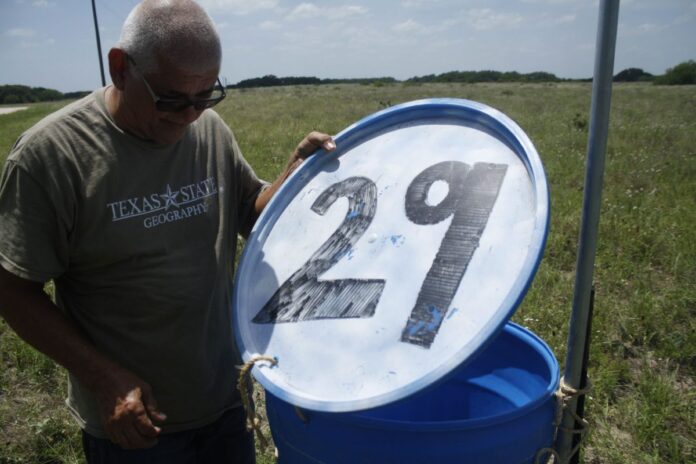NEAR FALFURRIAS — The sun blazed Tuesday afternoon as Eddie Canales and Anna Ibarra of the South Texas Human Rights Center took turns striking a three-foot metal rod into the ground with a sledge hammer for the first of 12 new water stations.
“Today is important for us because this is the first time we are allowed to set these stations up in this particular ranch,” said Canales, who allowed The Monitor to ride along with him on the condition the name of the ranch was not disclosed.
As the heat index climbed to over 110 degrees, Canales, 68, and Ibarra, 23, stood on the sandy soil of the ranch, which sits next to the U.S. Border Patrol checkpoint, and where hundreds of migrants have died trying to avoid detection.
So far this fiscal year (Oct. 1 to June 14), 35 migrant bodies or remains have been recovered in the Rio Grande Valley Sector, surpassing the 32 bodies at the same time last year, according Doyle Amidon, patrol agent in charge at the Falfurrias station.
Since the launch of the South Texas Human Rights Center in 2013, Canales has installed 98 water stations throughout Brooks, Jim Hogg and Hebbronville counties, including the 12 he set up Tuesday. The stations are made up of a blue 55-gallon plastic drum with the words “Agua” spray painted on the side.
Under the lid Ibarra wrote the geographical coordinates of each station along with the phone number for the South Texas Human Rights Center, so migrants in distress who might be lost can call and be located faster. A small white flag with a red cross stitched on it flies some 20 feet over the barrels or near the barrels to direct migrants to the gallons of water Canales and Ibarra place inside.
For the rest of this story and many other EXTRAS, go to our premium site, www.MyValleyStar.com.
Subscribe to it for only $6.99 per month or purchase a print subscription and receive the online version free, which includes an electronic version of the full newspaper and extra photo galleries, links and other information you can’t find anywhere else.
To report a missing person or to inquire about donating or volunteering at the center, you can call 361-325-2555 or email: [email protected].





